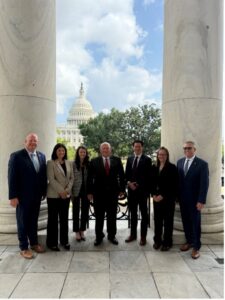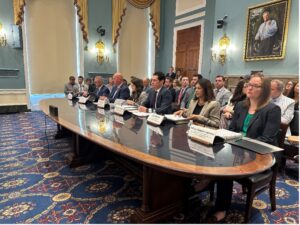Capital Update – For the Week Ending July 25, 2025
In the National Pork Producers Council’s weekly recap: NPPC testifies on impacts of California Proposition 12, Rep. Hinson introduces Prop. 12 fix; U.S. gets trade deals with Indonesia, Japan, Philippines, Vietnam; Hoskins, Hutchins USDA nominations advance; and Capital Update on modified schedule during congressional recess. Take a deeper dive below.
Listen to the Capital Update Here!
NPPC Testifies on Impacts of California Proposition 12; Rep. Hinson Introduces Prop. 12 Fix
What happened: NPPC Vice President Pat Hord, an Ohio pork producer, and NPPC economist Holly Cook testified before the House Agriculture Committee on the implications of California’s Proposition 12 for farmers and food prices. Click here to watch the hearing.
Prop. 12 has had negative impacts nationwide, fueling market volatility, imposing significant uncertainty on pork producers, and paving the way for a patchwork of inconsistent state regulations.
In the hearing, Hord and Cook explained to the committee how widespread adoption of measures similar to Prop. 12 would lead to even more consumers paying higher prices for pork, a result already experienced by Californians, who consume 13% of U.S. pork despite producing less than 1% of the pork supply.
Hord also addressed the misconceptions that Prop. 12 enhances food safety and animal welfare, citing opposition to the initiative from the American Veterinary Medical Association and American Association of Swine Veterinarians. Cook discussed the financial impacts on producers of converting to Prop. 12-compliant housing, as well as USDA research and recent data confirming the impact on consumer prices.
In a letter to Agriculture Committee Chairman Glenn “GT” Thompson (R-PA) the day of the hearing, Agriculture Secretary Brooke Rollins detailed USDA data showing California pork prices in increased 18.7% last month compared to June 2024. The data also shows that in the first quarter of 2025, 12% of small pork operations (<500 sows) exited the market or shifted production away from breeding, due to compliance costs and uncertainty.
In related news, Rep. Ashley Hinson (R-IA) introduced the NPPC-backed “Save Our Bacon Act” to avert the dangerous and chaotic web of conflicting farm regulations, including Prop. 12.
NPPC’s take: NPPC, which has led the fight against Prop. 12 for the past five-plus years, supports the efforts of Chairman Thompson and Rep. Hinson to address the threats Prop. 12 imposes on the U.S. pork industry, including the web of state regulations it invites. Learn more about NPPC’s advocacy clicking here.
Why it matters: Pork producers across the country must comply with Prop. 12 or forgo selling into the California market of 40 million people, who consume about 13% of all pork sold domestically. Most producers, particularly smaller ones, cannot afford the hundreds of thousands of dollars it would cost to retrofit existing or build new housing that complies with Prop. 12. The negative effects of Prop. 12 would be compounded if other states were to adopt similar restrictive laws and regulations.

Witnesses meet with Chairman Thompson (center) prior to the hearing. NPPC’s Hord is far right and Cook is third from left.

Witnesses testify before the House Agriculture Committee. NPPC’s Hord is far right and Cook is third from right.
U.S. Gets Trade Deals with Indonesia, Japan, Philippines, Vietnam
What happened: The United States recently hammered out trade deals with Indonesia, Japan, the Philippines, and Vietnam, giving a host of U.S. products duty-free access to those countries.
Under its agreement, Indonesia, which will have a 19% tariff on its exports to the United States, agreed to purchase $4.5 billion of U.S. agricultural products. It also will address non-tariff barriers to U.S. imports, including eliminating its import licensing regimes and recognizing U.S. regulatory oversight of agricultural products, including listing of all U.S. dairy, meat, and poultry facilities and accepting certificates issued by U.S. regulatory authorities.
Japan will pay a 15% duty on exports to America and further open its market to U.S. goods, including agricultural products. The U.S. pork industry already has significant access to the Japanese market, the No. 2 destination for U.S. pork exports.
Products from the Philippines will have a 19% tariff, while goods from Vietnam will have a 20% tariff. Products shipped through Vietnam from other countries – mainly China – will pay a 40% duty.
NPPC’s take: NPPC supports the trade agreements with Indonesia, Japan, the Philippines, and Vietnam, which are important markets for U.S. pork. NPPC will review the details of each agreement as they become available.
Why it matters: Agreements that eliminate tariffs on U.S. goods should boost exports of pork to those countries. The U.S. pork industry is highly dependent on exports, which in 2024 topped $8.6 billion and equated to an average of more than $66 in value from each hog marketed. Exports account for about 25% of total production and support more than 145,000 U.S. jobs.
Hoskins, Hutchins USDA Nominations Advance
What happened: The Senate Committee on Agriculture, Nutrition, and Forestry moved to the full Senate for confirmation the nominations of Dudley Hoskins as undersecretary for the U.S. Department of Agriculture’s Marketing and Regulatory Programs and Scott Hutchins as undersecretary for USDA’s Research, Education, and Economics mission area. Both were put on hold by the committee in May.
Hoskins currently is counsel on the Senate Agriculture Committee and previously was senior adviser to then-Agriculture Secretary Sonny Perdue and chief of staff for the MRP mission area in the first Trump administration. The mission area includes the Agricultural Marketing Service and the Animal and Plant Health Inspection Service.
Also serving during Trump’s first term, Hutchins was deputy undersecretary for the REE mission area, which consists of the Agricultural Research Service, Economic Research Service, National Agricultural Statistics Service, National Institute of Food and Agriculture, and the Office of the Chief Scientist.
NPPC’s take: NPPC strongly supports both Hoskins and Hutchins’ nominations. In May, it joined nearly 120 national and state agricultural organizations on a letter supporting Hoskins’ nomination and urging the Senate agriculture panel to approve him.
Why it matters: The MRP undersecretary oversees the agencies that facilitate domestic and international marketing of U.S. agricultural products, protect U.S. plant and animal health, regulate genetically engineered organisms, administer the Animal Welfare Act, and carry out wildlife management activities. They also help set national and international standards.
The REE undersecretary oversees programs that ensure a safe, sustainable, and competitive food system through integrated research, analysis, and education. The REE also serves as the conduit between the federal government and land-grant universities.
Capital Update on Modified Schedule During Congressional Recess
The U.S. House of Representatives began a month-long recess, and the Senate will soon follow. Capital Update will be issued on an as-needed basis during their break. It will resume regular publication the Friday following Labor Day.